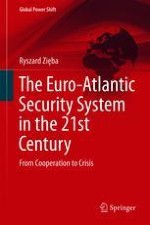2018 | OriginalPaper | Buchkapitel
2. The Euro-Atlantic Security System in the 1990s
verfasst von : Ryszard Zięba
Erschienen in: The Euro-Atlantic Security System in the 21st Century
Aktivieren Sie unsere intelligente Suche, um passende Fachinhalte oder Patente zu finden.
Wählen Sie Textabschnitte aus um mit Künstlicher Intelligenz passenden Patente zu finden. powered by
Markieren Sie Textabschnitte, um KI-gestützt weitere passende Inhalte zu finden. powered by
